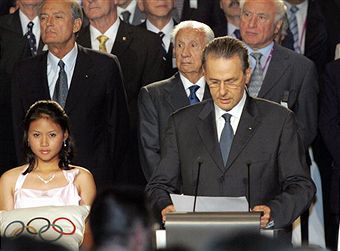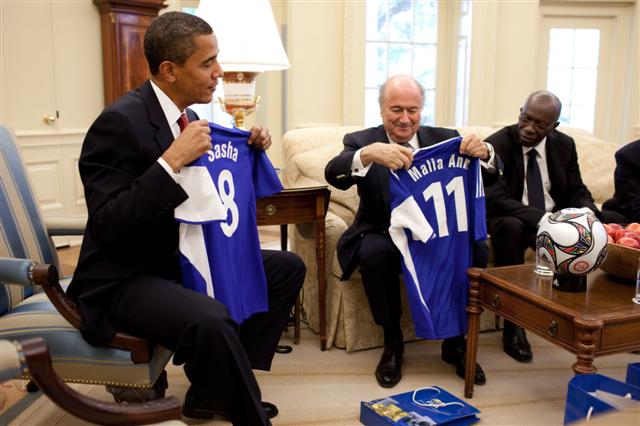So when will USA withdraw its bid from the 2018 World Cup and concentrate on getting 2022 for the States?
On the day of the FIFA Congress, immediately after Australia withdrew from 2018, rumours swept Sandton, the once exclusive white suburb now dominated by the huge statute of Nelson Mandela where the good and great of football have gathered, that the USA was about to pull out.
After all, why bother with 2018 when everyone knows that the entire FIFA Executive is agreed that 2018 must come back to Europe?
I never thought that USA would just follow the Aussies, not straight away in any case.
I believe USA will withdraw to concentrate on 2022, but that will not be until October. That month the FIFA Executive meet to decide the mechanics of the voting system.
Now you may think this is a trivial issue but it is actually very important. And in the race for 2018 and 2022, it could well prove quite crucial. The decisions made at that meeting will shape the deals which will decide these races.
For a start FIFA, being FIFA, its voting system is not quite as clearly set out and rigorous as that of the IOC. Recall back when Korea and Japan were bidding for 2002 and it looked as if Korea might win. João Havelange, then President, having promised Japan the competition, just decided there would not be a vote. The result: both countries shared the competition and Havelange justified it by saying it was necessary to save the face of the loser.
Sepp Blatter, his successor, cannot quite pull of anything like that. In an IOC vote on bidding cities, the IOC member from the country bidding cannot vote until his or her city is eliminated, but there are no such restrictions in FIFA.
Hence the famous remark of Craig Reedie, one of Britain’s IOC members, that his great wish was to go through an IOC vote on cities and never be able to vote, a wish he fulfilled in Singapore in 2005 when London won. In contrast, Geoff Thompson, the British member of the FIFA executive, is the one vote England can count on for definite.
Also, in an IOC vote on cities, the city with the lowest votes is eliminated and the members then vote again on the remaining candidates. This can lead to curious situations.
Take the vote in Moscow in 2001. Everyone knew Beijing was odds on favourite, despite attempts by Paris and Toronto to argue that China’s totalitarian system should not be rewarded. Istanbul was also in the race and nobody gave the Turks a chance. But the night before, the Turkish member of the IOC went round IOC delegates and said, “I know we will be beaten but please do not humiliate us.” And amazingly, in the first round while Beijing was miles ahead, Istanbul came second, beating Paris and Toronto which pleased the Turks no less. Clearly they had benefited from a sympathy vote by IOC members, confident it would not stop the Games going to China.
However, such tactical voting can go wrong, as it did when Chicago lost out to Rio last autumn for 2016. Some of the Asians who were for Chicago voted for Tokyo in the first round. They were persuaded by Japanese pleas that while Tokyo knew it would lose, it did not want to be humiliated. In the process it was Chicago who sensationally got dumped.
And this is where the voting system FIFA decides in October becomes important.
Normally, for such votes FIFA executive members are given a card with the names of the countries bidding. But with two bids being voted on at one meeting, will they given one card or two?
Remember, while all the non-Europeans, barring USA, have withdrawn from 2018, all the Europeans, including England, are technically still in the race for 2022, so a voting card for 2022 would also have to carry their names.
And how exactly will the vote take place? They first fill in the card for 2018, then get another card and vote immediately on 2022? Or is the result for 2018 declared before they vote on 2022?
More, how are the FIFA Executive members told about 2018? Are they told only the continent that has won? Are they told the name of the country? Are they given the details of the vote?
All these details matter because they can make or break deals. In an IOC vote, members are told which city has been eliminated but not the voting figures. This makes it more difficult to switch votes with confidence between various rounds. This may explain why, when London won in Singapore, Madrid’s vote went down between the rounds when you would have expected it to go up, much to the amazement of Juan Antonio Samaranch.
 Samaranch, to his dying day, remained convinced that, had Madrid not Paris got into the playoff with London, Madrid would have won. London too feared Madrid. The shout of joy that went up in the British camp when Madrid got eliminated was one of relief. And who is to say this happened because some Madrid supporters, not knowing the exact figures, pressed the wrong button in the round which eliminated them?
Samaranch, to his dying day, remained convinced that, had Madrid not Paris got into the playoff with London, Madrid would have won. London too feared Madrid. The shout of joy that went up in the British camp when Madrid got eliminated was one of relief. And who is to say this happened because some Madrid supporters, not knowing the exact figures, pressed the wrong button in the round which eliminated them?
With the USA bid committee led by former President Bill Clinton, the Yanks will know a thing or two about deals. They will look closely at the voting procedure FIFA decide in October and then make their announcement that they are concentrating on 2022.
America will go into any deals knowing it has three solid CONCACAF votes. At the CONCACAF Congress last week here in Johannesburg, the English presentation led by David Dein who opened the batting followed by Andy Anson, was by common consent the best. The CONCACAF delegates I met were positively drooling about it, far better than a poor Russia and a even poorer Spain-Portugal. But at the end of it Jack Warner, CONCACAF’s leader, said, “Our three votes are for the USA.”
But come October and the voting system known, America can then look at its options. It will then be in a position to make a deal with the strongest European challenger.
Let us say by October there is an European country – Russia, Spain-Portugal or England – with six votes. I discount Belgium-Netherlands because I do not believe they stand much of a chance. For the USA, its bargaining power is immense.
This is how I see the conversation going. The Americans say to the strongest European, “We give you our three, which takes you to nine and in an almost impregnable position [a winner requires 13 to win] and you give us your six which makes us very strong for 2022.”
The deal done, the USA withdraws saying how it welcomes 2018 coming back to the old world, all the time confident that 2022 will go to the new world.
It is worth stressing that an European-USA deal has been talked about for a long time. Michel Platini President of UEFA, discussed it with Sunil Gulati, President of the US Soccer Federation, more than a year and half ago. This was also something that Lord Triesman was working on, hoping to persuade Platini that England was the strongest of the Europeans.
The USA is certainly using the South African World Cup to make its public presence felt. Before they left the States, the entire team, including the players, were at the White House, Obama next to Clinton. It is rare in the US for an ex-President to be seen with a current one except on formal occasions like funerals.

Blatter was also entertained at the White House by Obama. Then here in South Africa, Joe Biden, the Vice-President had a good pow-wow with Blatter. Clinton will be here towards the end, as will Henry Kissinger and Spike Lee, the Americans combining power and Hollywood glamour.
In many ways, the USA’s pitch is similar to that of England: after all the excitement of South Africa, a new continent and all that, come back to safety and security, well organised events, that will also be very profitable. And the more problems the South Africans have, in transport, in stewards walking away from sites, the more the attractive USA becomes compared to its 2022 opponents where Qatar is making most of the running.
At the end of the day, the winners in 2018 and 2002 will depend on deals made after FIFA announces the voting procedure in October. And the Americans will do all the running on this.
How ironic, the new world will decide which country of the world has 2018. It will show football is like politics after all.
Mihir Bose is one of the world’s most astute observers on politics in sport and, particularly, football. He formerly wrote for The Sunday Times and The Daily Telegraph and until recently was the BBC’s head sports editor. His latest book, “World Cup 2010 South Africa: the Teams, the Players, the Venues”, is available now.

.jpg)